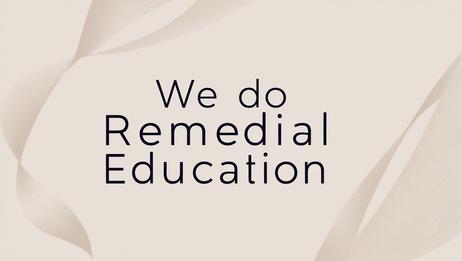How Community Colleges Are Changing Remedial Education
Community colleges provide educational opportunities for many students who might not otherwise have access to higher education. First-generation college students, single parents, and other nontraditional students make up a significant percentage of the community college population.
- For those who enter community college straight after high school and for those who have already completed some higher-level coursework, community college is a less challenging transition than for those who have been out of school for years or who are pursuing higher education for the first time.
- Many nontraditional students struggle when there is a gap between what they already know when they set foot on campus for the first time and what they are expected to know.
- That’s where remedial education comes in.
- Unfortunately, a review of years of remedial education has revealed that, instead of helping students succeed in their college careers, it acts as a brick wall that prevents them from moving forward.
- Keep reading to learn more about the history of remedial education and what community colleges are doing to change it.

What is Remedial Education?
Remedial education exists at all levels of education, from grade school to post-secondary education. A remedial program is typically designed to close the gap between what a student knows and what they are expected to know, typically in math and reading courses. Simply put, remedial instruction is designed to help struggling students strengthen their basic skills to help them succeed.
- In a primary education setting, remedial programs often serve to help struggling students improve their reading proficiency so they can succeed in their other classes.
- In many cases, students who are placed in remedial programs have average or higher intellectual ability, but they are not performing well in school for one reason or another. In most cases, these students struggle with one particular subject area.
- Remedial programs are intended to give those struggling students more individualized attention to build their skills as well as their confidence so they can live up to their academic potential.
- In the context of post-secondary education, remedial education is typically designed to help struggling students prepare for college-level coursework.
- These courses were intended to serve as a resource for struggling students to help them develop the skills they need to succeed throughout the rest of their college careers.
- Unfortunately, in many instances, the opposite seemed to be the result.
In this TED talk, Diana Ascencio explains remedial courses in community colleges.
The Problem with Remedial Education
Carlos Santiago, the Massachusetts state commissioner of higher education, joined the Department of Higher Education in 2013. When he joined the team, he reviewed data from the state’s remedial education programs. According to Santiago, about 12,000 students were placed into remediation after failing to pass the Accuplacer exam.
- According to the College Board, Accuplacer is an integrative system of computer-adaptive assessments that have been designed to evaluate an individual student’s skills in the areas of reading, writing, and mathematics.
- This exam has been used for 30 years to assess student preparedness for introductory-level credit-bearing college classes.
- In addition to answering questions about placement, the Accuplacer exam also makes diagnostic assessments to identify areas of strength and knowledge gaps in reading, writing, and mathematics.
- Santiago delved a little deeper into the program and discovered that of the 12,000 students placed in remediation, fewer than 2,000 had actually progressed to complete a credit-bearing course.
- This left Santiago wondering what had happened to those students and he was shocked to find that 80% of them had left school entirely.
- This meant that the program that was intended to serve as a skill-building resource for struggling students to help them succeed in higher education had actually become a barrier for them to complete their education.
Further review revealed the following problems that may have played a role in those students leaving the world of academics entirely following remedial education:
- Remedial education courses cost tuition money
- Students who passed remedial courses received no college credit
- Being placed in remedial programs carried a stigma of deficiency
- Remedial programs undermined student confidence rather than building it
According to the results of a new study, about 1 in 4 college freshmen who enter college after graduating from high school needed to enroll in remedial programs during their first year of college.
- If you knew nothing about remedial education prior to reading this article, you might assume that many of the students who are enrolled in remedial programs come from low-income or disadvantaged communities.
- After all, it is well-known that public schools located in areas of poverty often have lower levels of student performance.
- You may be shocked, then, to learn that 45% of students who were enrolled in remedial programs came from middle- and upper-income families.
- Remedial education doesn’t just affect students at all income levels; it also occurs in community colleges as well as public and private four-year schools.
- Forced remedial education doesn’t just set students back in terms of the time it takes to complete their degree,
- it can also cost them thousands of dollars.
- According to the aforementioned study, remedial coursework costs families nearly $1.5 billion each year. Per student, costs can be as high as $12,000 for remedial education to learn basic skills that should have been taught in high school.
- One final statistic that really drives home the problem with remedial education is the fact that college freshmen who take remedial courses at four-year colleges are 74% less likely to graduate than students who do not need to take remedial classes.
This video discusses the issues surrounding remedial education in community colleges.
What Are Community Colleges Doing Now?
A model that forces remedial students to pay for additional classes without receiving college credit is neither practical nor effective.
- Fortunately, Santiago has been working with area colleges to create and implement a new model – they call it a “co-requisite” model.
- In this program, students who are identified as having knowledge gaps in core subjects are allowed to enroll in college-level English and math courses for credit.
- They are also asked, however, to enroll in an additional course at the same time – one designed to fill in existing knowledge gaps to support them in their college-level education.
- One school that has seen great success with this model is Roxbury Community College (RCC).
Prior to implementing the co-requisite model, only about 25% of students who required developmental education went on to pass a college-level math course within two years.
- Now, with the new program, all struggling students take traditional college-level courses and two-thirds of them are passing those classes.
- Furthermore, RCC has started to offer different classes for students in need of development to introduce them to the math concepts they will need in further study instead of throwing them into a one-size-fits-all course.
- In addition to changing the face of remedial education, Santiago and other education leaders have begun to advocate for changes to the Accuplacer exam itself.
- National studies have indicated that the Accuplacer exam might underestimate student readiness for college-level coursework. To support this idea, consider that over 100 students who failed the exam were still entered into credit-bearing math courses.
- Instead of failing those classes, said students actually outperformed those who had passed the Accuplacer exam.
This video discusses the issue of unprepared students in the University of California community college system.
As a first step in dealing with this problem, many schools have begun to make placement decisions for incoming students based on their high-school grades rather than their Accuplacer exam scores. There are still those who defend the exam, however, because they claim that GPA doesn’t provide a clear picture of the entry-level educational skills a student brings to the table.
Though change is slow to come, many within the field of higher education are doing their best to improve opportunities for disadvantaged students. The coming years may see a significant change in remedial education and, hopefully, will result in more successful college careers for students in all forms of higher education.
Questions? Contact us on Facebook, Instagram, and YouTube. @communitycollegereview
#communitycollege #remedialeducation















